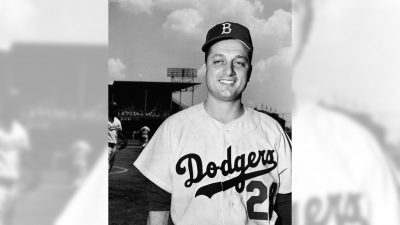Nosaj (left) and Heigh Keech, generating waves (Courtesy of Height Keech)
Outsider rapper Nosaj is still here — and generating waves
Banking off a cult status that has grown since the ‘90s, the New Kingdom rapper returns as half of Wave Generators
Nosaj never let go of his rap dreams. Even when his group New Kingdom struggled to make an impact in the 1990s, and even as he put his artist life on the back-burner for dad life, he kept envisioning himself on stage.
Over the years, though, the cult status of New Kingdom continued to grow, and a new generation of indie rappers embraced his gruff and unhinged rap style. But it was a career-defining chorus request from Armand Hammer — the hip-hop duo of billy woods and Elucid — that put a battery in his back, jolting him to return to hip-hop in 2020. Now, Nosaj (born Jason Furlow) has a new group called Wave Generators that he expects will define this epoch of his life.
“I be pushing the kids around, I could see the stage,” he says of those years in the early 2000s when he became a stay-at-home dad. “I knew the colors. I could see myself moving, but I didn’t actually know what I was saying or what it sounded like. I think this whole time I’ve been tweaking it. Now this is what I was envisioning. [Wave Generators] is that thing.”
Wave Generators, Nosaj’s group with Bronx-by-way-of-Baltimore producer and rapper Height Keech, embody a fearless spirit from two lifers in outsider rap. And it’s that mid-life and still independent-as-fuck attitude that gives Wave Generators their undeniable magnetism. Being a renegade artist isn’t exclusively for the youth. Loaded with defiant outlaw mantras over Keech’s power riff loops and wavy psyche-rock instrumentation, their album “After The End,” out June 11, is a thundering ode to the resilience it took to get to this moment. “Battery With No Rust” is a refusal of decay, while “I’ve Got My Whole Life Ahead of Me” thumps its chest in defiance that “where I’m going I can’t call it / I don’t know where it ends.”
Built to continue
Nosaj has always been this way and refused to change. He’s long wondered why more people don’t see it his way. In New Kingdom his bandmate Sebastian Laws insisted their sound should either be loved or hated, “never be in between.” Unfairly labeled as “rap/rock,” New Kingdom’s approach to hip-hop was hallucinogenic, abrasive, and de-evolved. Despite being signed to Gee Street, the same label as progressive groups like P.M. Dawn, The Jungle Brothers, and RZA’s side project with Prince Paul, Gravediggaz, New Kingdom struggled to find a wider U.S. audience beyond their cult status. Following their sophomore record “Paradise Don’t Come Cheap” in 1996, the group broke up feeling it had accomplished all it set out to do.
But for a new generation of rappers the legend of New Kingdom was growing through Youtube streams and used record bins. Elucid of Armand Hammer reached out to Nosaj for a chorus on Armand Hammer’s 2020 album “SHRINES,” and sent Nosaj to Steel Tipped Dove’s home studio to record his part. Nosaj put a lifetime of grievances into his energy on “Leopards” with “the savage in me / I can’t stop / Y’all made me this way / I’m too far gone to turn back now.” Steel Tipped Dove was unfamiliar with New Kingdom, but after witnessing Nosaj work quickly on the “Leopards” chorus, Dove said he was “blown away by his feature, so I played him some beats.” They did “Cree Summer,” which ended up on Nosaj’s 2023 album House of Disorder produced entirely by Steel Tipped Dove.
“Armand Hammer is the blessing,” Nosaj says. “They really propelled me back. I’m able to come in where people have already set the fucking table.”
While “Leopards” ingratiated Nosaj into the Brooklyn independent hip-hop community, he’d been quietly building a working friendship with Height Keech (born Dan Keech), who’d just moved to The Bronx from Baltimore. Nosaj was looking for a collaboration that was deeper than one-off records. Keech shared that desire after several of his own one-off collab records, including 2023’s “The Fall Collection” with Hemlock Ernst, the rap alias of Future Islands frontman Samuel T. Herring. They wanted a group that could tour, grow, and evolve.
“We wanted to make something that was built to continue,” Keech says. “A lot of times an album gets to the end and you realize this isn’t a band. This is just a cool thing to put on Bandcamp. I’m not downplaying any of that. But it’s never quite happened before where it just feels like the beginning instead of the end.”

Wave Generators (Courtesy Height Keech)
After the end
Wave Generators was built from the two purposely distorting Keech’s production, making numerous demos. Nosaj remixed demos in Serato, throwing Captain Beefheart or Kamasi Washington over it just to experiment. Which encouraged Keech to build weirder, psychedelic movements within the production. When it was time to record “After The End” in Pirate Studios, Nosaj brought a cardboard box of verses and loose thoughts on scrap paper he’d collected over 20 years. As for that album title by two artists north of 40, Keech says the Nosaj lyric stood out as a statement even though it has a different meaning within the song.
“With music you’re always thinking about what it’s going to be like when you get older,” he says. “The phrase ‘after the end,’ that’s what I think about. We’re after what I could have envisioned as the last point. And now here we are.”
For Nosaj the title reminds him of a compliment he’d often hear about New Kingdom that had him wondering if his time would ever arrive..
“When people say your band was so ahead of its time… OK, well the time is now,” he says. “It took everyone else so long and I’m still here.”
You might also like 


























